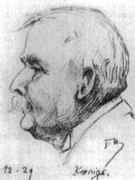Person: Koenigs, Gabriel Xavier Paul

Gabriel Koenigs was a French mathematician who worked on analysis and geometry.
Mathematical Profile (Excerpt):
- Koenigs was greatly influenced by Darboux and his first work was on geometry following work of Plücker and Klein.
- The work of G Koenigs in 1883-1884 was rigorous and contained, in particular, the results of Schröder.
- Koenigs noted that it would be desirable to determine the partitioning of the plane into domains in which the iterates of a function tend to attracting cycles, but observed that this would be very difficult and perhaps impossible for a general rational function.
- Koenigs studied analytic mechanics where he applied Poincaré's theory of integral invariants.
- It was decided that an International Congress of Mathematicians should take place in September 1920 and Koenigs, as the French delegate, invited the Congress to Strasbourg.
- In light of later events, it is apparent that Koenigs inflicted damage upon the cause of the Union by persisting in maintaining an anti-German policy although times had changed and the passions aroused by the war had largely cooled down.
- It is curious that Koenigs' archives in the Academy do not contain a single paper associated with the IMU.
- Nor are the activities of Koenigs in the Union mentioned in the memorial address of the French Academy, in his obituary, or in his biography.
- Others held equally sincere views that the Union's exclusion rules were right, in particular Koenigs strongly believed in the exclusions.
- Despite a general softening of views, Koenigs strongly opposed attendance by Germans but first the Executive Committee had to select a location for the 1928 Congress.
- Pincherle, as President of the International Mathematical Union, felt he could not press for Bologna but Koenigs went as far as to say that if Stockholm were chosen the unfavourable exchange rate would stop France and many other countries attending.
- However Koenigs, as the International Mathematical Union's General Secretary, argued that Germany should not attend since although they were eligible to join the International Research Council since 1926 they had not done so.
- Koenigs himself, however, did not attend.
- Koenigs was still General Secretary but was experiencing health problems and was not responding to any letter sent to him.
- Young was advised by de la Vallée Poussin to replace Koenigs, with Fehr being suggested as his replacement as General Secretary.
- Young did nothing, however, so in early 1931 de la Vallée Poussin informed everyone in the Bureau about his proposal to replace Koenigs.
- The matter was still unresolved when Koenigs died in October 1931.
- Let us mention some of Koenigs most important works: Mémoire sur les lignes géodésiques Ⓣ(Memoir on geodesic lines) (1892), La géométrie réglée et ses applications Ⓣ(The ruled geometry and its applications) (1895), Leçons de Cinematique: Professees a la Sorbonne Ⓣ(Cinematic lessons: taught at the Sorbonne) (1895-97); and Mémoires sur les courbes conjuguées dans le mouvement relatif le plus général de deux corps solides Ⓣ(Memoirs of conjugate curves in the relative motion of two solid bodies) (1910).
- This multiplicity of demands Professor Koenigs has met admirably by basing his exposition on the geometry of the straight line and employing the mobile trieder of reference; the latter in the hands of Ribaucour and Darboux has proved itself to be the most certain and powerful implement yet used in infinitesimal geometry and it naturally lends itself with equal facility and elegance to the geometry of displacement.
- In addition to these books, Koenigs published around sixty papers.
- The Bordin Prize of 1890 was to be awarded for work on differential geometry; Koenigs won for his essay on geodesics.
Born 17 January 1858, Toulouse, France. Died 29 October 1931, Paris, France.
View full biography at MacTutor
Thank you to the contributors under CC BY-SA 4.0! 

- Github:
-

- non-Github:
- @J-J-O'Connor
- @E-F-Robertson
References
Adapted from other CC BY-SA 4.0 Sources:
- O’Connor, John J; Robertson, Edmund F: MacTutor History of Mathematics Archive
